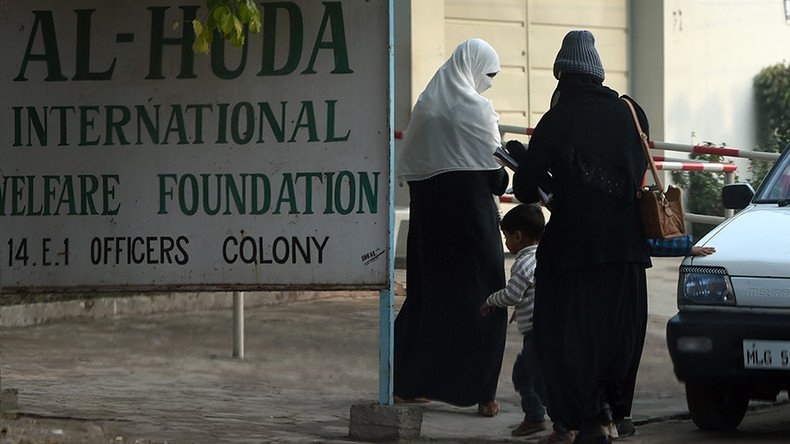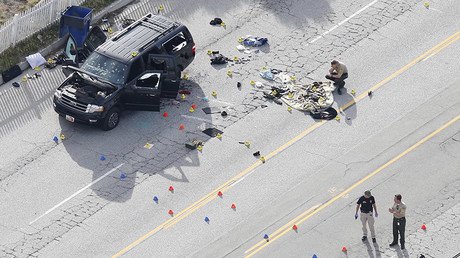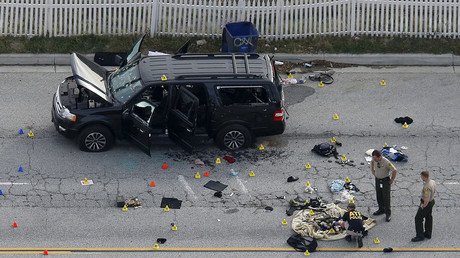San Bernardino shooter Tashfeen Malik attended conservative Islamic madrassa in Pakistan

The couple accused of carrying out the deadly San Bernardino, California terrorist attack last Wednesday, Tashfeen Malik and Syed Farook, were both radicalized “for quite some time.” Malik had studied at an all-women Islamic religious school in Pakistan.
The FBI believes that both Farook and Malik were radicalized “for quite some time,” but investigators do not know when, where or how they became extremists, Assistant Director David Bowdich told reporters on Monday morning. He would not give any details about how long they had been radicalized, and said they may never find evidence that another person led them to become extremists.
READ MORE: San Bernardino Shooting (LIVE UPDATES)
While studying to be a pharmacist, Malik also enrolled at Al-Huda, a madrassa where she would spend her evenings. She started the two-year course in mid-April of 2013 to learn about the Quran, its translation and interpretation, but she did not finish her studies before leaving in May 2014.
"According to our records, this girl didn't complete the course," Farrukh Chaudhry, a spokeswoman for the school, told AP. "She told us that she was going to get married in two months, and after that she will leave for America."
Investigators are exploring the possibility that Malik was radicalized before she arrived in the US.
Details about the mysterious 27-year-old are slowly emerging. Malik wore a niqab, a cloth that covers the face as part of her hijab and only left her eyes exposed. She did not drive and often stayed in the car when her husband went into the mosque to pray, the Washington Post reported. She did not want any photographs of herself without a veil, going so far as to try to remove all her pictures from university databases and destroying university and library cards.
She came from a prosperous Pakistani family who moved to Saudi Arabia about 25 years ago, but returned to Multan, about 100 miles away from her ancestral village in the Layyah district in Pakistan’s southern Punjab province, to complete a pharmacy degree at Bahauddin Zakariya University.
Teachers said they never noticed any signs of extremism in Malik.
"I have talked to her teachers, her classmates and everybody says she was a hardworking, friendly, helpful and obedient student," Chaudhry said. “No one ever noticed any signs of radicalization in her."
“She was a good girl. I don't know why she left and what happened to her," one of the teachers at Al-Huda, identified only as Muqadas, told AFP.
The madrassa insists it is not involved with the radicalization of its students. Al-Huda has no known links to extremists, but its founder has been criticized for promoting a conservative strain of Islam, AP reported.
“Government or law enforcement agencies have never suspected us of spreading extremism ‒ instead we preach the peaceful teachings of Islam and the prophet of Islam," Farrukh Saleem, a spokeswoman for Al-Huda, told AFP.
One of Malik’s friends, however, said that she changed around 2009.
“We were like, ‘What happened to Malik?’ ” Abida Rani, who attended pharmacy school with Malik all six years, told the Post. “She became so religious, so serious and so focused on Islamic teachings, and she lost her interest in her studies.”
She never discussed her personal beliefs, despite attempts by professors to engage their students in talks about science, philosophy and medical ethics, they told the Post.
“She never said to others: ‘You should do this or you should that’,” Khalid Janbaz, one of Malik’s pharmacology professors, said. “I don’t see any evidence how she could move from that into a shooter.”
“She was conservative but calm,” Atif Nisar Ahmad, a professor at the university, said.
Arif Rafiq, an analyst at the Washington-based Middle East Institute, told the Times of India that Malik’s attendance at the madrassa "suggests that she had embraced a more modern yet austere variant of Islam."
"It may have made her more susceptible to the ideology of a transnational terrorist group like IS," he added, referring to Islamic State (formerly known as ISIS/ISIL). However, he cautioned, the seminary’s graduates rarely become militants. "Al-Huda attendance alone doesn't answer the question of how she may have made the leap from being a conservative or even Salafi Muslim into a jihadist."
Her father, Gulzar Malik, who was estranged from relatives in Pakistan, became more religious after the move to Saudi Arabia. She returned to her family after graduating from Bahauddin Zakariya in 2013, which is where she met her husband through an online, Islamic marriage service.
She entered the United States in 2014 on a K-1, or "fiancée," visa, meaning the couple had to marry within 90 days of her arrival. They legally wed in Riverside, California in August 2014, although a lawyer for Farook’s sister said they were married at an earlier ceremony in Saudi Arabia, the Post reported.
Friends and coworkers described Farook as becoming more distant after he and Malik were wed.
Tashfeen Malik: A onetime 'modern girl' who managed to avoid detection before mass shooting https://t.co/pQPI03fqHCpic.twitter.com/xDaHHaiRSK
— L.A. Times: L.A. Now (@LANow) December 5, 2015“After he got married, I didn’t have the same connection with him,” Amir Abdul-Jalil, 50, who knew Farook and prayed with him regularly at a San Bernardino mosque, told the Post.
“Once he got married, it was just him and his family,” another friend from the mosque, Rashid Thompson, said. The couple had a six-month-old daughter.
Farook had been different ever since he returned from meeting his wife in Saudi Arabia, Christian Nwadike, who worked with him for five years, told CBS.
"I think he married a terrorist," Nwadike said.
Farook friend 'Enrique Marquez Jr.' named as buyer of rifles; Reportedly checked into mental hospital on Wed. https://t.co/xf3HvcI6dB
— TwitchyTeam (@TwitchyTeam) December 6, 2015More details are also emerging about where Farook and Malik got the modified “assault-style” weapons used in their deadly rampage. The FBI raided the Riverside home of Enrique Marquez Jr., early Saturday morning. Law enforcement returned to his home Sunday afternoon. Marquez is believed to have originally purchased the two rifles in 2011 and 2012, ABC News reported. Farook legally purchased the two handguns the couple used before he met Malik.
Marquez, 29, and Farook were childhood neighbors and close friends, but appeared to have grown distant in recent months, one of Marquez’s neighbors told NBC News.
On Wednesday, the 29-year-old checked himself into a mental-health facility in Long Beach, hours after Farook and Malik began their terrorist attack on a holiday party for the health department where Farook worked, the Daily Mail reported.
Marquez is not suspected in the terrorist attack in San Bernardino.














